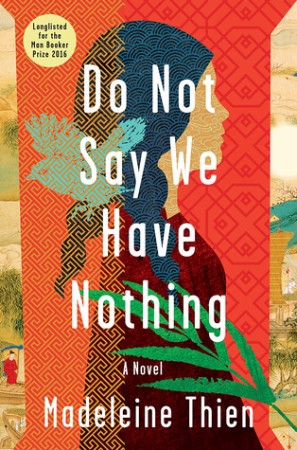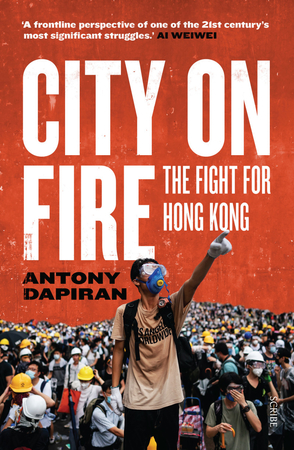The history of progress is a history of protest. We would have few of our modern rights if no one had stood up and demanded them. The books on this list cover some of the largest protests in the last century, protests that reshaped societies and reimagined futures. These books show that small groups of people speaking up for their rights can become powerful movements that change the world.
1989 Tiananmen Square Protests: Do Not Say We Have Nothing by Madeleine Thien
This sprawling novel covers generations of Chinese politics and upheaval through the lens of two young women, Marie and Ai-ming, as they try to unravel the mystery of why Marie’s father, Kai, killed himself. The women bond over a series of notebooks written by Ai-ming’s father, Sparrow, that detail Kai and Sparrow’s lives as friends and burgeoning musicians during China’s Cultural Revolution in the 1960s. As the Chinese government cracks down on artists and intellectuals, fear and political loyalties begin to tear the musicians apart.
1993 March on Washington for Lesbian, Gay and Bi Equal Rights and Liberation: When We Rise by Cleve Jones
Growing up in the 1950s, Cleve Jones feared he might be the only gay man in the world. But when he moves to San Francisco in the 1970s, he immediately finds community and purpose. Jones joins the fight for gay rights, and soon he’s thrown to the forefront of the AIDS crisis during its terrifying beginning. This memoir documents Jones’ incredible life, from his time working with Harvey Milk, to his organization of the AIDS Memorial Quilt.
Egyptian Revolution of 2011: The City Always Wins by Omar Robert Hamilton
Mariam and Khalil are reporters who end up on the front lines of the 2011 Egyptian revolution as they attempt to raise awareness about governmental corruption in Cairo. Thrust into the chaotic, Twitter-fied world of modern revolution, the couple discovers that they’re part of a new kind of battle, one that relies on Facebook posts as much as it relies on physical warfare.
1980 Gwangju Uprising: Human Acts by Han Kang
In Gwanju, South Korea, in 1980, student uprisings are met with brutal police violence. Centered around the tragic murder of a 15-year-old boy, this novel splinters into seven sections that each chart a different character who has a relationship to the murdered boy. In these sections, Kang tells a story of grief, brutality, and suppression that is both painful and painfully human.
Armed Resistance in Chile (1973–1990): Space Invaders by Nona Fernandez
Set in Chile in the 1980s, Fernandez’s novel focuses on a group of young school friends as they become close with a young girl, Estrella, whose father is a government officer. Though the violence of Pinochet’s dictatorship looms beyond school walls, the children are more focused on their favorite video game. But when Estrella suddenly disappears, the remaining children must wrestle with her probable fate, even as she continues visiting them in dreams and letters.
2019 Hong Kong Protests: City on Fire by Antony Dapiran
Anti-government protestors took to the streets of Hong Kong in the summer of 2019 and sparked a pro-democracy movement that took over the city for months. This movement created an entirely new kind of protest, one that had to fight not only police and tear gas, but also advanced surveillance technology. Dapiran offers an intimate look into contemporary Chinese politics, and a protest that has already changed China.
Dakota Access Pipeline Protests at Standing Rock, 2016- 2017: Our History is the Future by Nick Estes
What began as a small group of Indigenous people protecting their land from the Dakota Access Pipeline quickly became an environmental movement. Estes reports on the Water is Life movement at Standing Rock, then moves through time to examine the long history of Native American peoples attempting to protect and preserve their land from white settlers. This book presents the Water Protectors as an essential installment in a long line of Indigenous people protesting unjust seizure of their land by white Americans.
Occupy Wall Street 2011: The Not Wives by Carley Moore
Set against the uncertainty and financial instability of the Occupy Wall Street movement, this novel follows three women as they attempt to reinterpret the roles society has assigned them. Stevie is a professor and struggling single mother, her best friend Mel is a bartender who has become uncertain about her relationship with her wife, and Johanna is a homeless teenage runaway bound to Stevie through a shared tragedy. As the women navigate a city in protest, they must also revolt against their own identities.
Unapologetic: A Black, Queer, and Feminist Mandate for Radical Movements by Charlene A. Carruthers
Grassroots activist and one of the Roots’ most influential young African-Americans in 2017, Charlene A. Carruthers offers her extensive knowledge and experience in protesting and activism in this handbook on radicalism. With a focus on empathy and organization, Carruthers builds on the history of Black radicalism and offers new ideas on how to recenter political strategy around those who are the least served.









